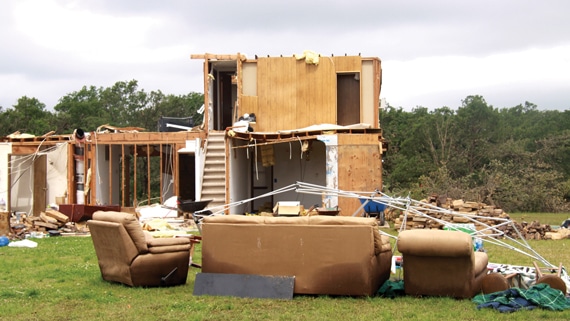
(CPN member Kimberly Vanderberg’s home was destroyed in the May 10 tornado.)
OKLAHOMA CITY – Oklahomans who have received notice from the Federal Emergency Management Agency (FEMA) that they are ineligible for disaster assistance following the May 10-13 tornadoes and storms may be able to use additional documentation to turn that “no” into a “yes.” “Every applicant has the right to appeal a decision,” said Federal Coordinating Officer Gregory W. Eaton. “In fact, applicants can appeal any FEMA decision. When you do so, you are asking us to review your case again, and we will gladly do that.”
Applicants who received a letter stating they are “ineligible” should read that document carefully. It will list some reasons the aid was denied and provide instructions on filing an appeal. Some common reasons an applicant may be determined ineligible include:
· Insufficient storm-related damage.
· Adequate insurance coverage.
· Additional personal or insurance information needed to complete the assistance evaluation process.
· Confusion about Social Security numbers, addresses, or phone numbers. If FEMA can’t contact you, your application may be denied.
Applicants may appeal the decision if they find circumstances have changed from the time they registered. They may have discovered additional damage to their property, or that they need housing help after all. Renters may find upon returning that their residences are unlivable. “The Oklahoma Department of Emergency Management and FEMA understand that circumstances after a disaster can be fluid and changeable,” said State Coordinating Officer Fred W. Liebe. “Oklahomans have the chance to report those changes – changes that could make the difference in becoming eligible for disaster assistance.”
Effective appeal letters should follow these procedures:
· In the first paragraph, list the applicant’s full legal name used on the aid application, along with Social Security number and the FEMA case number. Include a personal phone number as well as a back-up phone number where the applicant also can be reached, in addition to a correct mailing address.
· Write an explanation of events that provides evidence to support the appeal. Summarize changes in circumstances or needs, additional damages to property discovered after the registration was filed or higher-than-planned costs for repairs, for example.
· Include photocopies of receipts for materials and labor as well as up to three written bids for repair work if those costs exceed the award amount. Submitting repair estimates, receipts, statements or invoices helps applicants lodge effective appeals.
Also keep in mind:
· The appeal letter must be submitted within 60 days of the date on the denial letter — by mail, or by fax at 1-800-827-8112, or in person at a state/federal Disaster Recovery Center. Keep a copy of the appeal letter and supporting documentation as a record.
· Information on how and where to file an appeal is included with denial letters and in the “Help After a Disaster” booklet that is included with registration packets.
One of the best sources of help with an appeal is the network of Disaster Recovery Centers. Applicants can get guidance on the appeal process at any of the three centers currently open in Oklahoma to support those affected by the spring storms. Another option is FEMA’s Helpline at 1-800-621-FEMA (3362), TTY 1-800-462-7585 for the hearing and speech impaired. For more information on Oklahoma disaster recovery, browse the features on this FEMA website at www.fema.gov/Oklahoma or visit the OEM site at www.oem.ok.gov or follow OEM on Twitter at http://twitter.com/okem. Users of smart phones and other mobile devices can visit m.fema.gov.
